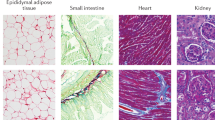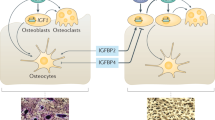Abstract
The decline of growth hormone (GH) and insulin-like growth factor I (ICF-I) production during aging has been likened to the decrease in gonadal steroids in menopause. The repletion of GH/IGF-I levels in aging individuals is suggested to restore the lean tissue anabolism characteristic of youth1. In addition to anabolic effects on musculoskeletal tissues, GH also stimulates mammary glandular growth in some species2–4, although its effects on primate mammary growth remain unclear5. Some clinical observations implicate GH in human mammary growth, for example, gynecomastia occurs in some children treated with GH (ref. 6), and tall stature and acromegaly are associated with an increased incidence of breast cancer7,8. To investigate the effects of GH/IGF-I augmentation on mammary tissue in a model relevant to aging humans, we treated aged female rhesus monkeys with GH, IGF-I, GH + IGF-I or saline diluent for 7 weeks. IGF-I treatment was associated with a twofold increase, GH with a three- to fourfold increase, and GH + IGF-I with a four- to fivefold increase in mammary glandular size and epithelial proliferation index. These mitogenic effects were directly correlated with circulating GH and IGF-I levels, suggesting that either GH or its downstream effector IGF-I stimulates primate mammary epithelial proliferation.
This is a preview of subscription content, access via your institution
Access options
Subscribe to this journal
Receive 12 print issues and online access
$209.00 per year
only $17.42 per issue
Buy this article
- Purchase on Springer Link
- Instant access to full article PDF
Prices may be subject to local taxes which are calculated during checkout
Similar content being viewed by others
References
Rudman, D. et al. Effects of human growth hormone in men over 60 years old. N. Engl. J. Med. 323, 1–6 (1990).
Forsyth, I.A. The mammary gland. Baillieres Clin. Endocrinol. Metab. 5, 809–832 (1991).
Kleinberg, D.L., Ruan, W., Catanese, V., Newman, C.B. & Feldman, M. Non-lactogenic effects of growth hormone on growth and insulin-like growth factor-l messenger ribonucleic acid of rat mammary gland. Endocrinology 126, 3274–3276 (1990).
Plaut, K., Ikeda, M. & Vonderhaar, B.K. Role of growth hormone and insulin-like growth factor-l in mammary development. Endocrinology 133, 1843–1848 (1993).
Kleinberg, D.L. et al. Primate mammary development: Effects of hypophysectomy, prolactin inhibition, and growth hormone administration. J. Clin. Invest. 75, 1943–1950 (1985).
Malozowski, S. & Stadel, B.V. Prepubertal gynecomastia during growth hormone therapy. J. Pediatr. 126, 659–661 (1995).
Hunter, D.J. & Willett, W.C., Diet, body size, and breast cancer. Epidemiol. Rev. 15, 110–132 (1993).
Nabarro, J.D., Clin. Endocrinol. (Oxf) 26, 481–512 (1987).
LeRoith, D. et al. The effects of growth hormone and insulin-like growth factor I on the immune system of aged female monkeys. Endocrinology 137, 1071–1079 (1996).
Cerdes, J., Schwab, U., Lemke, H. & Stein, H. Production of a mouse monoclonal antibody reactive with a human nuclear antigen associated with cell proliferation. Int. J. Cancer 31, 13–20 (1983).
Kelly, P.A. et al. The growth hormone/prolactin receptor family. Recent Prog. Harm. Res. 48, 123–164 (1993).
Djiane, J., Houdebine, L.M. & Kelly, P.A. Prolactin-like activity of anti-prolactin receptor antibodies on casein and DNA synthesis in the mammary gland. Proc. Natl. Acad. Sci. USA 78, 7445–7448 (1981).
Fuh, G. & Wells, J.A. Prolactin receptor antagonists that inhibit the growth of breast cancer cell lines. J. Biol. Chem. 270, 13133–13137 (1995).
Martinez, A.J. Prolactin and carcinoma of the breast. Mayo Clin. Proc. 67, 1011–1012 (1992).
Bondy, C.A. et al. Clinical uses of insulin-like growth factor-l. Ann. Intern. Med. 120, 593–601 (1994).
Yee, D. et al. Analysis of insulin-like growth factor I gene expression in malignancy: Evidence for a paracrine role in human breast cancer. Mol. Endocrinol. 3, 509–517 (1989).
Neuenschwander, S. et al. Involution of the lactating mammary gland is inhibited by the IGF system in a transgenic mouse model. J. Clin. Invest. 97, 2225–2232 (1996).
Hadseli, D.L., Greenberg, N.M., Fligger, J.M., Baumrucker, C.R. & Rosen, J.M. Targeted expression of des (1-3) human insulin-like growth factor I in transgenic mice influences mammary gland development and IGF-binding protein expression. Endocrinology 137, 321–330 (1996).
Adesanya, O.O., Zhou, J. & Bondy, C.A. Sex steroid regulation of insulin-like growth factor system gene expression and proliferation in primate myometrium. J. Clin. Endocrinol. Metab. 81, 1967–1974 (1996).
Lee, A.V. & Yee, D. Insulin-like growth factors and breast cancer. Biomed. Pharmacother. 49, 415–421 (1995).
Baum, H.B. et al. Effects of physiologic growth hormone therapy on bone density and body composition in patients with adult-onset growth hormone deficiency. Ann. Intern. Med. 125, 883–890 (1996).
Toogood, A.A., Adams, J.E., O'Neill, P.A. & Shalet, S.M. Elderly patients with adult-onset growth hormone deficiency are not osteopenic. J. Clin. Endocrinol. Metab. 82, 1462–1466 (1997).
Mulligan, K., Grunfelf, C., Hellerstein, M.K., Neese, R.A., & Schambelan, M., Anabolic effects of recombinant human growth hormone in patients with wasting associated with human immunodeficiency virus infection. J. Clin. Endocrinol. Metab. 77, 956–962 (1993).
Author information
Authors and Affiliations
Rights and permissions
About this article
Cite this article
Ng, S., Zhou, J., Adesanya, O. et al. Growth hormone treatment induces mammary gland hyperplasia in aging primates. Nat Med 3, 1141–1144 (1997). https://doi.org/10.1038/nm1097-1141
Received:
Accepted:
Issue Date:
DOI: https://doi.org/10.1038/nm1097-1141
This article is cited by
-
A comparison of various methods for measuring breast density and breast tissue composition in adolescent girls and women
Scientific Reports (2022)
-
Acromegaly and male sexual health
Reviews in Endocrine and Metabolic Disorders (2022)
-
Pallister–Hall syndrome with orofacial narrowing and tethered cord: a case report
Journal of Medical Case Reports (2018)
-
Determinants of volumetric breast density in Chilean premenopausal women
Breast Cancer Research and Treatment (2017)
-
Gynecomastia and hormones
Endocrine (2017)



